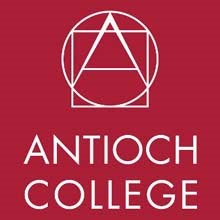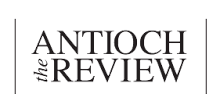 Since the beginning of March, when the Board of Antioch University announced that they had hired Dr. Michael Fishbein to be the new president of Antioch University McGregor, various sectors of the community have been eagerly awaiting his arrival. Although he is not due to start until July 1, Dr. Fishbein was in town for a few days this week cultivating and recruiting members for the new McGregor Board of Trustees and meeting with the press and other representatives of the community. In an interview at McGregor this week, Fishbein revealed a few things about his personal life and talked about his vision for the school.
Since the beginning of March, when the Board of Antioch University announced that they had hired Dr. Michael Fishbein to be the new president of Antioch University McGregor, various sectors of the community have been eagerly awaiting his arrival. Although he is not due to start until July 1, Dr. Fishbein was in town for a few days this week cultivating and recruiting members for the new McGregor Board of Trustees and meeting with the press and other representatives of the community. In an interview at McGregor this week, Fishbein revealed a few things about his personal life and talked about his vision for the school.Fishbein was reared in the Sunnyside neighborhood of the Borough of Queens in New York City. In those days, Sunnyside was well known for its boxing arena and, according to Fishbein, he watched more than a few matches there as a kid. If he learned anything about ducking a hook and landing a counterpunch it might serve him well in his new position.
He went on to attend the prestigious Stuyvesant High School where, he said, he discovered the lure of Manhattan. When he matriculated at CUNY’s Baruch College, also in Manhattan, he thought he wanted to be a businessman. One semester of accounting and a psychology course he enjoyed convinced him otherwise, he said. He graduated Cum Laude in Psychology. With an M.A. and Ph.D. in Social Psychology from Clark University and he decided he wanted to be a life-long teacher of Psychology and write great books.
“I wanted to be a version of Mr. Chips,” Fishbein said.
But again, his academic life took another unforeseen turn. After one semester of teaching psychology in the graduate program at Roosevelt University in Chicago, he was recruited as head of the department.
“I was a pretty fair teacher,” Fishbein said. “But I found I could contribute more by working on bettering the interaction between faculty and students. It was only natural that I would ascend to administration.”
He quickly learned that wasn’t going to be all that easy when he took a job as a Dean at Russell Sage College. But eventually, his biggest critic grew to be his strongest supporter, he said. His last stop before Yellow Springs was as Provost and Vice President of Academic Affairs for the past 5 years at Daniel Webster College in Nashua, NH.
Fishbein and his wife Mary Ann Oppenheimer will reside in Beavercreek. Oppenheimer is a professional fundraiser for the nonprofit sector and they are not sure from whence her employment opportunities might come. Beavercreek will presumably offer a convenient jumping off point for both of them.
“Beavercreek is just a little bit away from the city and the campus,” he said. “I might sleep in Beavercreek, but I will really live in Yellow Springs.”
He recently agreed to serve on the Board of Community Resources and is looking to be active in the community in other ways.
His first challenge at McGregor will be to help populate a board of trustees from the ground up. The Board of Governors of Antioch University recently amended its bylaws to provide for independent boards for each of its five colleges, the first private university system to do so. So this week, Fishbein will be spending much of his time talking to prospective board members. Dayton Chamber of Commerce President Phil Parker has already been selected as chair of the interim board, which will ultimately be comprised of 15 members. Five have already committed to sit. The colleges are each required to seat 11, the minimum number to launch a board, by September.
“I am looking for people who can help me expand my networking role as ambassador for this institution,” Fishbein said. “I am looking for trustees who care about McGregor as an educational institution, who will take it and move it forward.”
Fishbein has a three part vision for Mcgregor. The first is as a college community that understands that it is a family dedicated to the students of the region.
“This campus is its own institution,” he said. “It must chart its own path.
The second part has to do with identity.
“Who are we in the public mind?” he said. “Ohio is rich in education. We have well defined areas of expertise.”
He lists those areas as teacher education; liberal studies for students who don’t fit elsewhere; conflict analysis and management; and responsiveness to working adults. Other areas of need will be identified, he said and education will be delivered in a variety of ways: online, where the subject matter lends itself to the medium; low residency where students take courses online, but come to the campus for a week three times a year; and the traditional classroom.
“Antioch has a tradition of face-to-face education,” Fishbein said. “For some programs, we do not want to disturb that. But online education is a way of spreading the reach of the institution.”
He noted that McGregor is well positioned to assist those who for a variety of reasons, including the current downturn in the economy, might be looking to change their careers.
The third part of his vision is “program diversity.”
“We have high quality programs, but not enough of them,” he said. “We have room in our mission to do that which we are not doing.”
One example he gives as an area of concern for the Dayton region that might give rise to a program is “health and wellness.”
Asked about possible future relations with a revived Antioch College, should that occur, Fishbein said, “If Antioch College opens under the current plan, no one will wish them well more than we will. However, Antioch McGregor will continue on its path doing what we do well. If there are points for collaboration, that will be okay.”
He also hopes to collaborate with the region’s community colleges and other institutions of higher education.
As for such programs as the MIIND (McGregor Institute for Intellectual Development) Chautauqua series and the Yellow Springs High School immersion program, both of which were leading to increased relations between McGregor and residents of the village before his arrival, Fishbein said that while he is still learning about these programs, he would be more than happy to continue any productive associations. The advantage of collaboration with the high school, he said, is that it is an opportunity to open students’ eyes to higher education by bringing them to a college campus.
“It’s a chance for the college faculty to enlarge their dreams and aspirations,” he said.
Fishbein is determined to move McGregor forward in a number of ways.
“The problem for higher education is that the weaknesses that are being revealed have always been there,” he said. "[Early educators] didn’t anticipate the resources it would take to sustain our current system of higher education. We have to provide new models for higher education to sustain itself.”
He hopes to test out new possibilities at McGregor and reach out to students in effective, but affordable ways, he said.
Referring to those who think of digital technology as being disruptive to education he said, “The invention of chalk and the black board was once viewed as the death of education as we know it. We can use these new tools to do a better job of educating.”
Related post: Antioch Mcgregor has a new President








No comments:
Post a Comment